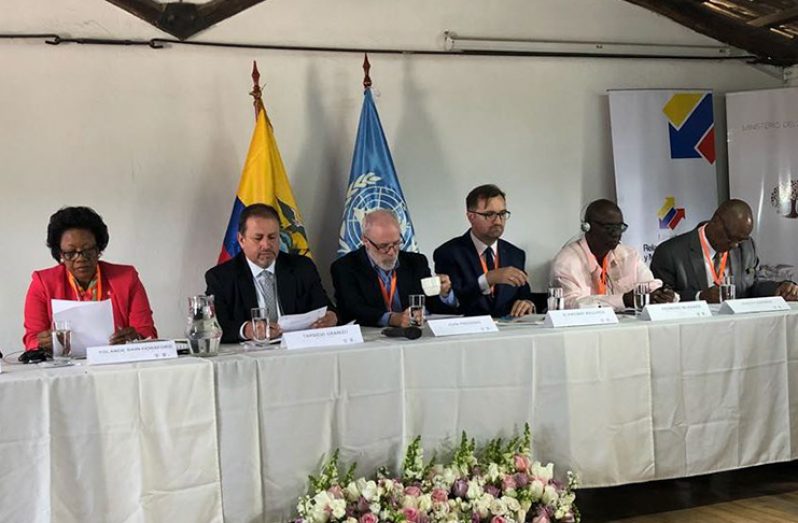— to tackle flooding in mined-out areas
GUYANA has requested assistance from the UN and other bodies to find solutions to flooding in mined-out areas as it looks at reforestation projects for bauxite areas in Region 10 and to install solar energy systems in those communities.
This was disclosed by Minister of State Joseph Harmon during his address at the UN Convention to Combat Desertification (UNCCD) in observance of World Day to Combat Desertification (WDCD) on June 17 in Ecuador.
Harmon told the event, themed: “Land has true value – invest in it,” that Guyana in 2005 was ravaged by a massive flood that wiped out 25 per cent of its GDP for that year.
As a result of the floods, Harmon explained that agricultural land on the coastland was severely damaged. Some 80 per cent of the population reside on the coastal plane.
“On the other hand, there are communities on the border with Brazil that experience severe drought and floods annually…. we worked with the Brazilians in digging reservoirs to trap the water during the flooding period which is later released during the drought and that is a work in progress,” he explained.
Some 85 per cent of Guyana is covered by forest and the country is deemed a net carbon sink, but the economy depends heavily on agriculture and mining of minerals.
“Only recently, there was a massive discovery of oil which was the largest discovery in the last 100 years off the coast of Guyana. This has the potential of transforming the country in a significant way,” the minister of state said.
GREEN STATE AGENDA
Guyana is blessed with natural resources and President David Granger last year outlined the Green State Development Strategy (GSDC).
In explaining President Granger’s vision, Harmon said it will lay the foundations for inclusive green economic growth, provide a roadmap for achieving sustainable development targets, and outline a long-term vision for a prosperous and equitable future.
Further, he explained that the GSDS will integrate relevant commitments adopted under Guyana’s international agreements. In particular, the strategy will be aligned with the Agenda 2030 for Sustainable Development and the Sustainable Development Goals, reflecting the objectives of the country and well-being of all Guyanese.
COMMITTED
Harmon assured the gathering that Guyana is committed to addressing the issues of degradation, land desertification and drought.
He also thanked the Food and Agriculture Organisation (FAO), UNCCD, Ecuador’s Ministry of Environment and others for the invitation and echoed the sentiments of Desmond McKenzie, Minister of Local Government and Community Development of Jamaica, who praised the organisers for giving the Caribbean a voice at the forum.
As such, he said Caribbean countries will have a chance to highlight their challenges and best practices for dealing with the issue at hand.
The UNCCD noted that desertification, land degradation and drought affect hundreds of millions of people in over 100 countries in all continents and the numbers are rising.
The annual global loss of 75 billion tonnes of soil sums up to an estimated global economic loss of US$400 billion. Some 42 per cent of the world’s poorest people live in degraded areas. During a drought, the poorest households experience crop-income losses that are proportionally higher than the wealthiest.
The World Day to Combat Desertification was established by the UN General Assembly 23 years ago to be celebrated by every country in order to raise global awareness about the status of, and the priority actions taken at global and national levels to reverse desertification and land degradation and strengthen responses to drought.



.jpg)









